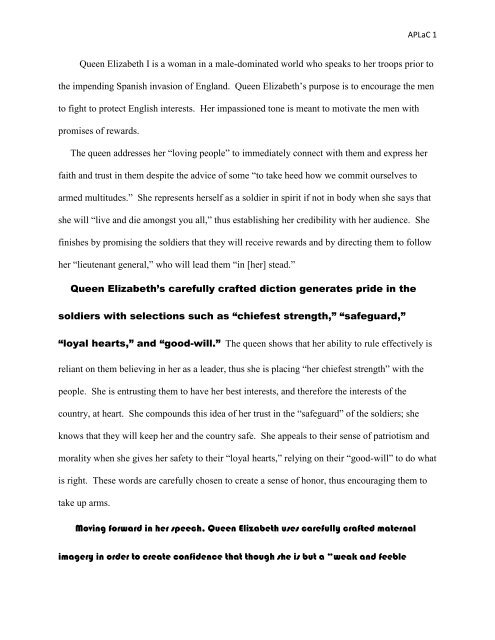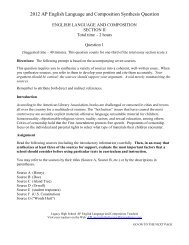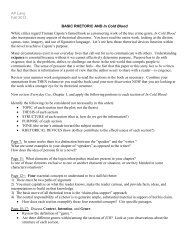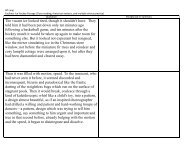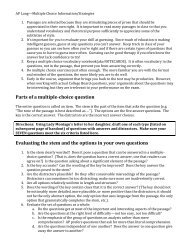Queen Elizabeth I is a woman in a male-dominated world who ...
Queen Elizabeth I is a woman in a male-dominated world who ...
Queen Elizabeth I is a woman in a male-dominated world who ...
You also want an ePaper? Increase the reach of your titles
YUMPU automatically turns print PDFs into web optimized ePapers that Google loves.
APLaC 1<strong>Queen</strong> <strong>Elizabeth</strong> I <strong>is</strong> a <strong>woman</strong> <strong>in</strong> a <strong>male</strong>-dom<strong>in</strong>ated <strong>world</strong> <strong>who</strong> speaks to her troops prior tothe impend<strong>in</strong>g Span<strong>is</strong>h <strong>in</strong>vasion of England. <strong>Queen</strong> <strong>Elizabeth</strong>’s purpose <strong>is</strong> to encourage the mento fight to protect Engl<strong>is</strong>h <strong>in</strong>terests. Her impassioned tone <strong>is</strong> meant to motivate the men withprom<strong>is</strong>es of rewards.The queen addresses her “lov<strong>in</strong>g people” to immediately connect with them and express herfaith and trust <strong>in</strong> them despite the advice of some “to take heed how we commit ourselves toarmed multitudes.” She represents herself as a soldier <strong>in</strong> spirit if not <strong>in</strong> body when she says thatshe will “live and die amongst you all,” thus establ<strong>is</strong>h<strong>in</strong>g her credibility with her audience. Shef<strong>in</strong><strong>is</strong>hes by prom<strong>is</strong><strong>in</strong>g the soldiers that they will receive rewards and by direct<strong>in</strong>g them to followher “lieutenant general,” <strong>who</strong> will lead them “<strong>in</strong> [her] stead.”<strong>Queen</strong> <strong>Elizabeth</strong>’s carefully crafted diction generates pride <strong>in</strong> thesoldiers with selections such as “chiefest strength,” “safeguard,”“loyal hearts,” and “good-will.” The queen shows that her ability to rule effectively <strong>is</strong>reliant on them believ<strong>in</strong>g <strong>in</strong> her as a leader, thus she <strong>is</strong> plac<strong>in</strong>g “her chiefest strength” with thepeople. She <strong>is</strong> entrust<strong>in</strong>g them to have her best <strong>in</strong>terests, and therefore the <strong>in</strong>terests of thecountry, at heart. She compounds th<strong>is</strong> idea of her trust <strong>in</strong> the “safeguard” of the soldiers; sheknows that they will keep her and the country safe. She appeals to their sense of patriot<strong>is</strong>m andmorality when she gives her safety to their “loyal hearts,” rely<strong>in</strong>g on their “good-will” to do what<strong>is</strong> right. These words are carefully chosen to create a sense of honor, thus encourag<strong>in</strong>g them totake up arms.Mov<strong>in</strong>g forward <strong>in</strong> her speech, <strong>Queen</strong> <strong>Elizabeth</strong> uses carefully crafted maternalimagery <strong>in</strong> order to create confidence that though she <strong>is</strong> but a “weak and feeble
APLaC 2<strong>woman</strong>,” she has the “heart and stomach of a k<strong>in</strong>g of England.” She anticipates thesoldiers’ concerns about her ability to lead due to her gender, and she forthrightly attacks thatnotion <strong>in</strong> order to d<strong>is</strong>pel it. She offers a contradictory def<strong>in</strong>ition of herself with v<strong>is</strong>ceral bodilyreferences with which the soldiers can identify; they understand that “hearts and stomachs” arenecessary for survival. They understand that her commitment to England, her “heart andstomach”—her will—supersede the limits of her frail body. Her anger piqued, the queen <strong>is</strong><strong>in</strong>censed that the k<strong>in</strong>gs of Parma or Spa<strong>in</strong> would dare attack her realm; she pa<strong>in</strong>ts an image oftheir wrongful th<strong>in</strong>k<strong>in</strong>g by address<strong>in</strong>g their “treachery.” By appeal<strong>in</strong>g to the soldiers’ sense ofnational<strong>is</strong>m and patriot<strong>is</strong>m, she enjo<strong>in</strong>s them to believe that their cause <strong>is</strong> just and good. Theyfeel obliged to protect their country because they have right on their side.Hav<strong>in</strong>g establ<strong>is</strong>hed her strength as a leader, the peroration directs the soldiers forward <strong>in</strong>tobattle. Her complex syntax, <strong>in</strong>clud<strong>in</strong>g anaphora and repetition, shifts the focus from her role as leader to theirrole as soldiers. The queen states: “…I myself will take up arms, I myself will be your general,judge, and rewarder of every one of your virtues <strong>in</strong> the field” focuses the audience on her role astheir commander through repetition, which emphasizes her commitment. The soldiers believethat they will be paid <strong>in</strong> money and <strong>in</strong> honor. Her role as commander cemented, the queen passes theresponsibility for w<strong>in</strong>n<strong>in</strong>g the battle onto the men’s shoulders as evidenced by her parallel structure. Sheassures them that they will w<strong>in</strong> “but by your obedience to my general, by your concord <strong>in</strong> thecamp, and your valour <strong>in</strong> the field…” and further drives her po<strong>in</strong>t home by restat<strong>in</strong>g the fact thatright <strong>is</strong> on their side “over those enemies of my God, of my k<strong>in</strong>gdom, and of my people.” There<strong>is</strong> no way they can lose.
APLaC 3<strong>Queen</strong> <strong>Elizabeth</strong> <strong>is</strong> highly effective <strong>in</strong> encourag<strong>in</strong>g the men to fight for England. Present<strong>in</strong>gherself as an em<strong>in</strong>ent leader, she gives them their march<strong>in</strong>g orders. Her sentiments appeal to thesoldiers’ sense of honor, and thus they will follow her commands because they are emotionallymoved to do so.Strategy: diction<strong>Queen</strong> <strong>Elizabeth</strong>’s <strong>in</strong>spirational diction rallies her troops to fight with choices such as “virtues,” “valour,”and “victory.”Rev<strong>is</strong>ed sentence:<strong>Queen</strong> <strong>Elizabeth</strong>’s carefully crafted diction generates pride <strong>in</strong> thesoldiers with selections such as “chiefest strength,” “safeguard,”“loyal hearts,” and “good-will.”Strategy: imagery<strong>Queen</strong> <strong>Elizabeth</strong> uses carefully crafted maternal imagery <strong>in</strong> her speech to the troops at Tilbury <strong>in</strong> order tocreate confidence that though she <strong>is</strong> but a “weak and feeble <strong>woman</strong>,” she has the “heart and stomach of ak<strong>in</strong>g of England”; she demonstrates her devotion to the troops by forc<strong>in</strong>g them to picture her “tak[<strong>in</strong>g] uparms” as she herself becomes their “general, judge, and rewarder of every one of [their] virtues <strong>in</strong> thefield.”Rev<strong>is</strong>ed sentence:Mov<strong>in</strong>g forward <strong>in</strong> her speech, <strong>Queen</strong> <strong>Elizabeth</strong> uses carefully crafted maternalimagery <strong>in</strong> order to create confidence that though she <strong>is</strong> but a “weak and feeble<strong>woman</strong>,” she has the “heart and stomach of a k<strong>in</strong>g of England.”Strategy: syntax<strong>Queen</strong> <strong>Elizabeth</strong>’s complex syntax, <strong>in</strong>clud<strong>in</strong>g antithes<strong>is</strong> and anaphora, reflects the charged circumstancesshe faces <strong>in</strong> address<strong>in</strong>g military men as a fe<strong>male</strong> leader with sentences like: “…I know that I have thebody but of a weak and feeble <strong>woman</strong>; but I have the heart and stomach of a k<strong>in</strong>g, and of a k<strong>in</strong>g ofEngland…,” followed by “…I myself will take up arms, I myself will be your general, judge, andrewarder of every one of your virtues <strong>in</strong> the field.”Rev<strong>is</strong>ed sentence:Her complex syntax, <strong>in</strong>clud<strong>in</strong>g anaphora and repetition, shifts the focus from her role as leader to their role assoldiers. … Her role as commander cemented, the queen passes the responsibility for w<strong>in</strong>n<strong>in</strong>g the battle ontothe men’s shoulders as evidenced by her parallel structure.


